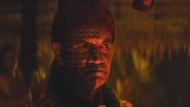Episode 6 of Chief of War pulls back the curtain on politics that do not merely involve loud drum beats and clashing spears. Sometimes it is the silent glance, the half-said sentence, or the tiny hesitation that can indicate whether a kingdom is marching towards war or peace. The sixth episode of Chief of War teases us into a smaller, more targeted drama, even as the battle turns more personal.
King Kahekili is a fierce warrior on the battlefield, but off it his rule somehow seems to crumble. His son, Prince Kupule, is not rebellious. Rather, he appears to be uncomfortable about and quite opposed to his father's maddening bloodlust. Is Kupule just a well-meaning son seeking to mellow his father's violence or is Kupule part of a secret conspiracy against him?
Chief of War on Apple TV+ sets us up for a mystery by giving us small clues: Prince Kupule's secret doubts, King Kahekili's growing fear, and the manner in which the other chiefs continue to eye the throne.
** Disclaimer: This article contains spoilers for the episode of Chief of War being discussed, as well as the show in general. **
What's simmering beneath King Kahekili's reign in Chief of War?

Chief of War Episode 6 proves that Kahekili's reign has slowly starting to weaken. In addition, the show employs minute but vivid details such as quiet council reactions, whispered conversations and cruel punishments, that suggest that his grip is no longer as firm as it seems. Many of the chiefs on Maui are clearly uneasy with his mounting cruelty and desire for conquest. Behind closed doors, these chiefs begin to discuss alternatives, and their gaze naturally turns to Kupule, who appears calmer and more balanced compared to his father.
On the screen, Prince Kupule's secret conversations and nervous glances indicate that he does not trust his father's ways. King Kahekili obviously becomes aware of the fact and begins to withhold himself from giving any major responsibility to his son. So, the tension between a questionable heir and a watchful ruler generates pressure that may ultimately harm the legacy of Kahekili.
The fact that Chief of War chooses to depict the political impact of this slow wearing down of relationship through the nuanced use of gestures rather than endless battles, almost makes us believe that Kupule could become the heir to the throne. Whenever Kahekili detects danger, he does not argue out loud. Instead, he replies using his dramatic power, reminding everyone who is still sitting on the throne.
Prince Kupule's quiet resistance in Chief of War: Speculations explored

So what does Prince Kupule really feel: Is it fear, duty toward his father, or a quiet sense of resistance? The sixth episode of Chief of War depicts him in a calm, restrained manner, and the plot progression relies on delivering subtle hints rather than big speeches. Kupule confesses to the people he trusts that he wants to "reach" his father. The assertion could be a sincere one, or it could simply be a careful way to turn off more bloodshed, at least for now.
The internal conflict of Kupule also becomes quite evident for the audience: He complains about Kahekili's cruel methods but is not willing to take direct action against him yet. Onscreen, there are a few clues, like his hesitation before answering a question, his stolen glances towards the skeptical chiefs, and his unwillingness to take men into bloody combat. These are the signs of passive resistance and not a loud revolt. However, they highlight a refusal to totally give in.
Refraining from acting in public can be a powerful and strategic move, too, because it undermines King Kahekili's authority without causing an immediate outbreak of violence. It could also be that Prince Kupule is deliberately holding back to have more time to plan and keep the people around him safe. By not condoning his father's thirst for violence, he sows the seed of a different type of leadership.
Kupule's little actions allowed other chiefs to dare to hope and whisper, gradually building an opposition. If he wins their trust, Kupule could be the inside force that changes everything, without ripping the kingdom apart in civil war.
Can King Kahekili actually sense the quiet shift, and what does he do about it in Chief of War?

Is King Kahekili really able to feel the silent rebellion growing in his son? He is presented as both powerful and fragile in the course of Episode 6 of Chief of War. He is a formidable warrior on the battlefield outside, but a leader plagued by insecurity on the inside. Paranoia usually follows when a king begins to see hesitation where there used to be blind loyalty.
King Kahekili's reaction is early damage control. He no longer trusts easily, defies commands, and orders public punishments to scare others into compliance. These moves are the traditional maneuvers of a monarch fearful of rebellion rising within the four walls of his own household. So, he makes bold, grand displays of power to make it clear who is in charge.
Some chiefs have already hinted at Kupule as an alternative, and if Kahekili hears that, the cut would be deep. His behaviour indicates that he might already know something about what's going on. He picks up clues from the secret meetings that some people have with his son.
This sets up a vicious circle in Chief of War: His suspicion makes him more cruel, his cruelty feeds more unrest, and his unrest makes him more suspicious. For the audience, the story is not just about conflicts of strength but also about grief, family, and a broken father-son relationship. That is why Kahekili's fear is both personal and political, and why the island now sits on the brink of crisis.
For more such insights on Chief of War, keep following Soap Central.
